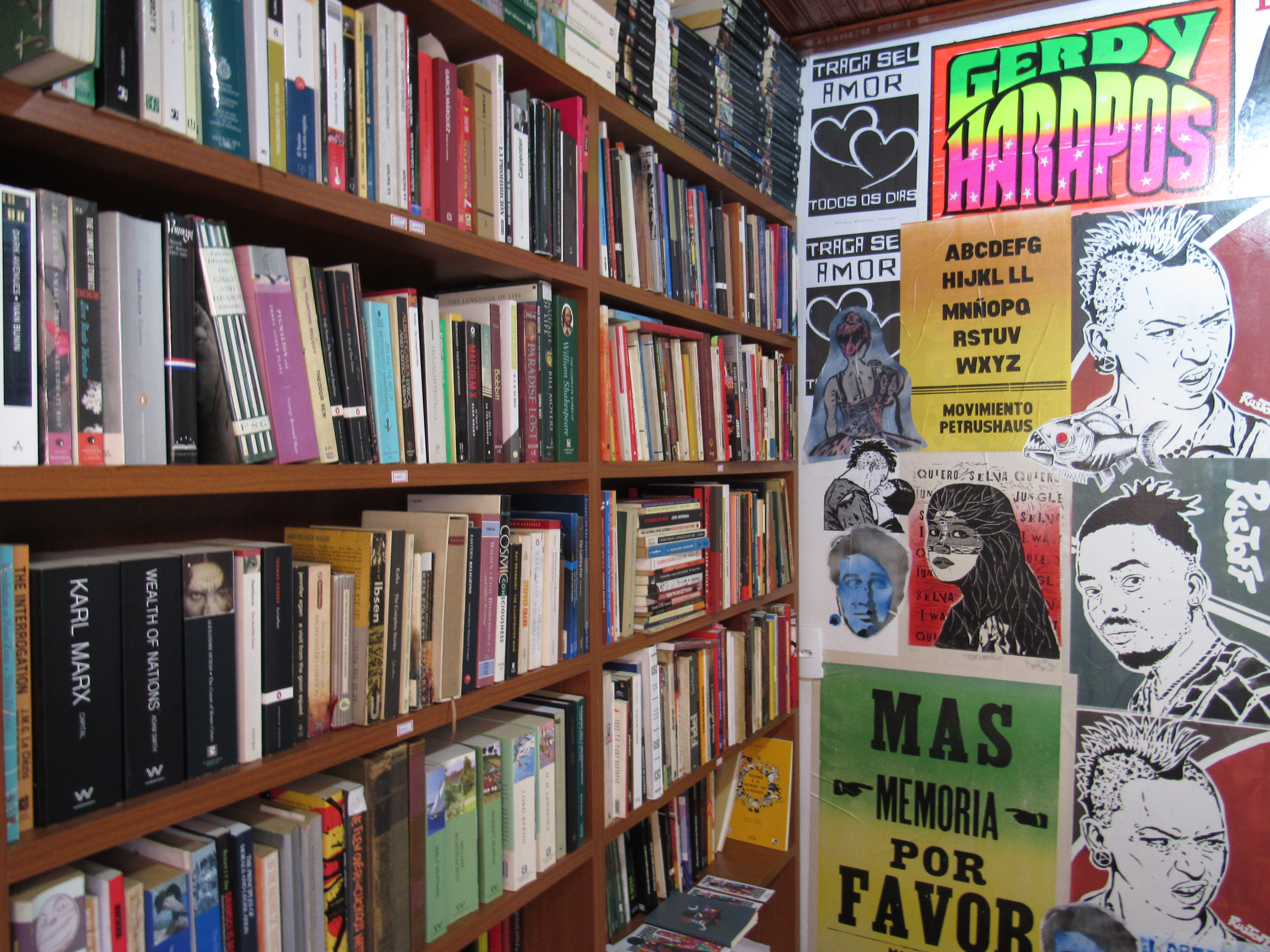Glamour and Envy: remarks on the Madness of Consumerism, with John Berger…

(Via Awestruck Wanderer)
Fellow earthlings! Many among us are surrounded by images of Photoshoped, Barbiesque, and very highly-paid top-models. Many of us have the unfortunate luck to be surrounded by an army of ads and its insistent and annoying injunctions: “Buy! Own! Consume! Work! Obey! Enrich! Just do it!” Many of us have been told – and the stupidiest among us have even believed in it! – that Money will open the gates of Heaven for anyone who’s smart enough to get his hands in a lot of it.
This pervasive commercial imageryinfest the cities where capitalism and “modernity” reign (and also in the places where Imperial power took them…). They command us to consume products that large multi-national corporations are devoted to selling us. These corporations don’t want anyone of us to wonder about the work conditions for the people who actually produced them (and usually are very badly paid and live in places of terrible health conditions… remember Nike’s sweatshops in Asia?). The corporations don’t want any of us to question this system that permits extreme accumulation of wealth in a few hands (the last time I checked the statistics, 85 people were the owners of a wealth equivalent to that of half of Mankind).
The publicity machinery is destined to turn us into stupid unquestioning puppets, who give their money away in exchange for products whose real producers are being explored and kept in poverty in lots of societies who, in the Global Market, are the peryphery of cheap labour destined to suffer miserably through life so that the so-called First World can enjoy the delirious delights of Consumerism. As most of you are quite aware, this has been wrecking our planet and, if it’s allowed to go on, will only lead us to witness, in coming years, some of the worst ecological catastrophes ever endured by our species – and all other who share with us this “pale blue dot”, as Carl Sagan called it. But enough, for today, of my awkwards incursion into Saganesque ecology or Marxist critique of the commercial-society’s trashy productions… Let’s put aside the theme of ecocide and save it for another ocassion, fellow earthlings!
Many have pointed out that the “subliminal effect” of modern marketing campains is to brainwash us into a nowadays very wide-spread behaviour: that which is dominant on consumerist societies. You can’t be possible consider yourself a fully-fullfiled person if you’re not the owner of fancy cars, chic houses, hi-tech electronic devices, jewels and gizmos… The so-called Show Business is a factory of dreams who attempt to invade our subconscious minds and turn us into morons who obbey ads like Pavlov’s dogs did with the bells.
We are made to believe, by this day-to-day conditioning, not very disimilar to Aldous Huxley’s Brave New World techniques of mass indoctrination, in a link between Happiness (or The Greatest Good in Human Life) and consumerism and ownership. In BBC’s documentary The Century of the Self, the tale is told of a certain Mr. Edward Bernays, Sigmund’s Freud nephew, who was a key figure in the United States early 20th century mass-conditioning of consumering citizens. It’s scary to take a look behind the curtains and discover these sinister experiments that contributed so much to boost up capitalism. Wherever Free Market capitalist gained predominance, it created as by-products of consumerism an unbelievably high mountain of trash – literal trash, but also aesthetic trash (I mean: ugly ads and terrible publicity images). We’ve been going mad on this overdose of images with promises of delight – if only you buy! Many of us, fellow earthlings, have forgotten all delights that can’t be bought, all the beauty that can’t be owned, all the happiness that can be experienced without any need of possessions.
The manufacturers of this Show Bizz dreams, those who sponsor the Mass Media, those who spread through society this images that promise delight in connection with the enjoying of a bought merchandise, they’ve been leading large portions of mankind into a very questionable path: that of seeking for happiness in the process of buying and owning things, in having instead of being. We’ve been praising competition instead of cooperation, individualism instead of collective effort, superficial glamour instead of genuine beauty.
Well, at least these were some of the thoughts that popped up in my head while I was watching BBC’s Ways of Seing, in which John Berger embarks in similar considerations about what Guy Debord called La Societé Du Spetacle. Berger has lots of interesting things to say about Consumerist Society’s imagery and how they produce large amounts of toxic envy and cheap glamour. According to Berger’s interpretation, glamour is something that evokes or produces, in its receiver, a feeling of envy. Glamorous images are supposed to depict something desirable, something to strive for; they’re ideal scenes who don’t intend in any away to portray reality. They appeal to our emotions and try to manipulate them into a set-up that’s deemed profitable by the economical powers reigning in commercial societies, and “personified” in banks and stock markets.
Imagine a woman who sees in a daily basis, for years and years, gorgeously sexy and wealthy women exhibiting all their glamour in magazines and outdoors – figures such as the millionaires Kate Moss or Gisele Bünchen. One of the possible effects is: this woman will envy that which the fabricated image is supposed to depict. Once again, the subliminal effect is intended to be: you’ll only be a happy and fulfilled human if you look like Moss or Bünchen… Thus the epidemics of gyms, plastic surgery, silicone boobs, anorexia – among other techniques that try to turn a woman into something similar to a commercially produced cliché. Our ideals of beauty have been so deformed by publicity’s invasion of the public space, by its invasive glamourous imagery, that feelings of low self-steem, depression and inedequacy are skyrocketing (just check Prozac’s sales!). But well, I’ll shut up right now and summon Mr. Berger to continue this debate – so here it comes, a quote from Ways of Seeing fourth and last episode, certainly one of the greatest critiques of publicity ever aired on TV:
“Publicity is the process of manufacturing glamour. Without social envy, glamour cannot exist. Envy becomes a common emotion in a society that has moved towards democracy and then stopped halfway. Where status is theoretically open to everyone, but enjoyed by only a few. (…) Publicity and oil painting share many of the same ideals, all of them related to the principle that you are what you have. (…) Publicity appeals to a way of life we aspire to, or think we aspire to, but have not yet achieved. A publicity picture suggests that if we buy what it is offering, our life will be different from what it is. Not only will our home be different, but all of our relationships will become radiant because of our new possessions. But we can only achieve such radiance if we have money, thus urging each of us to scramble competitively to get more… and making money appear as if it were itself magical. (…) It promotes the illusion that a man’s ability to consume is directly related with his sexual virility. According to the rules of the dream, those who do not have this power, those who lack glamour, become faceless, almost non-existant. Publicity both promises and threatens. It plays upon fear, often the fear of not being desirable, of being unenviable. It suggests that you are inadequate as you are, but it consoles you with the promise of a dream… But the highest value of this civilization is the individual ego… one can only say this culture is mad.” – BERGER
[youtube id=http://youtu.be/5jTUebm73IY]
Publicado em: 05/02/14
De autoria: casadevidro247




